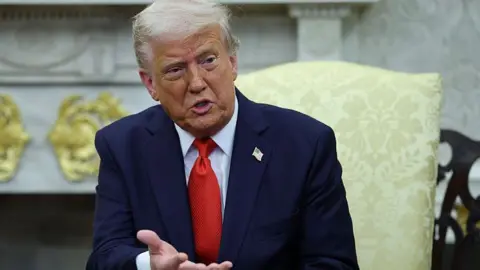The International Monetary Fund (IMF) has made a significant adjustment to its global growth forecasts, primarily due to the adverse impacts of international trade tariffs. Notably, the U.S. has experienced the most considerable downgrade among advanced economies; the IMF now estimates the nation’s growth for this year at 1.8%, a stark reduction from its previous prediction of 2.7% made in January. This adjustment reflects heightened uncertainty surrounding trade policies, particularly as the U.S. has implemented various tariffs on imported goods.
The IMF emphasized that this increase in trade tariffs will likely precipitate a “significant slowdown” in global economic growth. This revised outlook extends to the United Kingdom as well, which is anticipated to grow by only 1.1% this year. The revised forecasts were unveiled amidst a critical meeting of top economic policymakers, including those from the IMF and World Bank, who convened in Washington to address ongoing economic challenges.
Pierre-Oliver Gourinchas, the IMF’s chief economist, emphasized the lingering effects of past economic shocks on the global economy. He stated that it continues to be “severely tested” amidst renewed uncertainties that stem largely from trade conflicts. President Donald Trump has made various announcements regarding tariffs this year, notably instituting taxes on goods imported from China and other nations as part of a broader trade war strategy. For instance, tariffs on Chinese goods reach as high as 145%, while retaliatory tariffs from China on American products are set at 125%.
Additionally, the U.S. has placed a blanket 10% tariff on goods from a vast majority of other countries, while holding off on implementing more severe rates for several nations for a temporary span of 90 days. Trump has articulated that these tariffs are designed to stimulate the domestic economy by encouraging American consumers to choose home-made products, thereby boosting local manufacturing and generating increased tax revenues. However, the IMF pointed out the broader and potentially damaging implications of these tariffs on international trade, especially given the interconnected nature of modern supply chains, warning that such uncertainties could lead businesses to curb investments and spending.
Furthermore, the IMF has downgraded its global growth forecast to 2.8% this year, down from 3.3% initially projected. The organization’s outlook for 2026 anticipates a modest recovery at 3.0%. The downward revision for U.S. growth is attributed to heightened policy uncertainties, trade tensions, and unexpectedly sluggish consumer spending. The IMF also expects the growth rate for China to decrease to 4.0% this year, from a prior estimate of 4.6%.
In the UK, the IMF’s downward adjustment takes into account the ripple effects of tariffs, alongside escalating government borrowing costs and reduced consumer spending due to increased energy prices and other living costs. Interestingly, the IMF’s prediction for the UK in 2025 aligns with the Office for Budget Responsibility’s previous forecast of growth nearing 1%. Chancellor Rachel Reeves highlighted that the UK remains, according to the IMF, the fastest-growing economy within Europe’s G7 group.
As part of its broader analysis, the IMF presents various growth forecasts, underscoring the complexity of economic assessments that are continually influenced by shifting circumstances. For instance, the eurozone’s growth forecast has been revised down to 0.8% from an earlier estimate of 1%, while Spain is projected to experience an upgrading of its growth estimate to 2.5% due very much to rebuilding efforts following recent flooding incidents.
Additionally, the IMF’s outlook for Canada has been adjusted to a growth forecast of 1.4% this year, down from 2.0%, while Mexico has suffered a substantial downgrade, with projections indicating an expected contraction of 0.3% instead of the previously expected growth of 1.4%. Acknowledging the unpredictability of future trade policies, Gourinchas noted that while the current estimates serve as a reference point, numerous potential outcomes exist due to the evolving nature of tariffs and trade negotiations globally.
Overall, the IMF’s reassessment of economic growth prospects showcases the precarious balance economies must manage amidst ongoing geopolitical tensions and trade disputes, underscoring the need for strategic policy measures that can stabilize growth and foster resilient economic environments.



